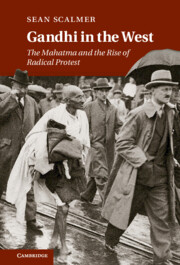Crossref Citations
This Book has been
cited by the following publications. This list is generated based on data provided by Crossref.
Erickson Nepstad, Sharon
and
Kurtz, Lester R.
2012.
Nonviolent Conflict and Civil Resistance.
Vol. 34,
Issue. ,
p.
xi.
Nepstad, Sharon Erickson
2013.
Nonviolent Civil Resistance and Social Movements.
Sociology Compass,
Vol. 7,
Issue. 7,
p.
590.
Khanduri, Ritu Gairola
2013.
Gandhi and the Satyagraha of Newspaper Cartoons.
Visual Anthropology Review,
Vol. 29,
Issue. 1,
p.
1.
Harvey, Kyle
2014.
American Anti-Nuclear Activism, 1975–1990.
p.
93.
Davidson, Mark
and
Iveson, Kurt
2014.
Occupations, mediations, subjectifications: fabricating politics.
Space and Polity,
Vol. 18,
Issue. 2,
p.
137.
Besier, Gerhard
2014.
Does National Mythmaking End at the Border?.
Kirchliche Zeitgeschichte,
Vol. 27,
Issue. 2,
p.
233.
Adams, Matthew S.
2015.
Kropotkin, Read, and the Intellectual History of British Anarchism.
p.
101.
TOMPKINS, ANDREW
2016.
Grassroots Transnationalism(s): Franco-German Opposition to Nuclear Energy in the 1970s.
Contemporary European History,
Vol. 25,
Issue. 1,
p.
117.
McIlvenny, Paul
2017.
Identity Revisited and Reimagined.
p.
41.
Khan, Sammyh S.
Svensson, Ted
Jogdand, Yashpal A.
and
Liu, James H.
2017.
Lessons from the past for the future: The definition and mobilisation of Hindu nationhood by the Hindu nationalist movement of India.
Journal of Social and Political Psychology,
Vol. 5,
Issue. 2,
p.
477.
Cornfield, Daniel B.
Coley, Jonathan S.
Isaac, Larry W.
and
Dickerson, Dennis C.
2018.
Race, Identity and Work.
Vol. 32,
Issue. ,
p.
217.
Gregg, Richard Bartlett
and
Tully, James
2018.
The Power of Nonviolence.
2018.
The Power of Nonviolence.
p.
lxii.
2019.
Indien im Sucher.
p.
415.
Rai, Swapnil
2019.
“May the Force Be With You”: Narendra Modi and the Celebritization of Indian Politics.
Communication, Culture and Critique,
Vol. 12,
Issue. 3,
p.
323.
Archer, Robin
2020.
The Appeal to Honour and the Decision for War.
Journal of Historical Sociology,
Vol. 33,
Issue. 2,
p.
248.
Livingston, Alexander
2020.
“Tough Love”: The Political Theology of Civil Disobedience.
Perspectives on Politics,
Vol. 18,
Issue. 3,
p.
851.
HODDER, JAKE
2021.
Casting a Black Gandhi: Martin Luther King Jr., American Pacifists and the Global Dynamics of Race.
Journal of American Studies,
Vol. 55,
Issue. 1,
p.
48.
Slate, Nico
2021.
A Dangerous Idea: Nonviolence as Tactic and Philosophy.
Modern Intellectual History,
Vol. 18,
Issue. 4,
p.
1130.
King, Anna S.
2022.
The Wiley Blackwell Companion to Religion and Peace.
p.
289.





